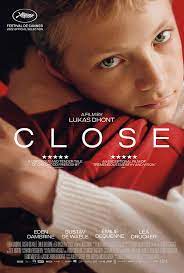
CLOSE
Belgium, 2022, 104 minutes, Colour.
Eden Dambrine, Gustav De Wale, Emilie Dequenne, Lea Drucker, Igor Van Dessell, Kevin Janssens,
Directed by Lucas Dhont.
A small film in many ways, confined to a somewhat small world, but providing a dramatic microcosm for some important emotional experiences. And, it has been acclaimed, Grand Prix at Cannes, Oscar nomination amongst others. And deserved.
This is a story of friendship, two young boys, Leo and Remi, neighbours, who have known each other for years, are best friends, playing together, using their imaginations to create games in some old ruins, exhilaratingly running through the fields of flowers and crops, enjoying sleepovers, sharing family meals, one listening to the other play the oboe, and their imagining that their friendship will be like this forever.
Writer-Director, Lucas Dhont (whose previous film was Girl, the story of a boy who saw himself as a girl and wanted to be a dancer) introduces us into a happy world, where people are happy, ordinary life, work in the fields, work in hospitals, no one anticipating that harsh realities could enter into their lives.
And, the performances by the two boys, their first film roles, Eden Dambrine as Leo having to be the anchor of the whole film, Gustav De Wale as the sensitive Remi, are extraordinarily real and convincing. They elicit sympathetic responses from us, which will be important in what is to follow.
We now live in a world, a world of social media, everything available, which means that we are probably all too self-conscious, especially in a world which has become more and more sexualised, sometimes incapable of recognising authentic friendships and relationships.
And that is the tragedy of Close. Even the schoolchildren at their new school start asking questions, (which we, the audience, maybe despite ourselves have already been thinking and wondering) snickeringly raising their eyebrows, insinuating about the relationship between Leo and Remi. And despite children aged 13. So, what will happen, Leo becoming conscious of how is talked about, some homophobic slurs, and his beginning to distance himself from Remi, at school, at home, fewer sleepovers, his taking up ice hockey to keep away from Remi.
The dramatic happens. The film is skilful in helping us to appreciate what was happening to Remi and his being hurt by Leo’s rejection of him. We appreciate Leo’s self-assertion but regret that he has to do it at Remi’s expense.
So, this is a very sad film, the effect of the tragedy on Remi’s parents, a poignant scene where his father breaks down at a meal at Leo’s house where his reliable older brother speculates about his future and the father weeps. The mother is stronger and tries to fathom with Leo what has happened.
Can there ever be a happy resolution to this kind of breaking of friendships, no possibility of recovering the past, having to live and make one’s life even with the consequences?
Yes, the Belgian microcosm, a universal celebration of friendship and a challenge to the threats to enduring friendship.
- The directness of the title? Its meaning? Friendship?
- The Belgian setting, universal application? Children’s friendships? The breaking of friendships? Consequences?
- The town, homes and interiors, the fields, the flowers, sowing, harvest? School? The excursion to the sea? The surrounding countryside? The musical score?
- The introduction to Leo and Remi, 13 years old, the long friendship, happy in each other’s company, in the dark, in the ruins, playing the imaginary game, running through the flowers, the games, the bike riding, the sleepovers, Leo and the meals at Remi’s house, eating spaghetti technique…? The boys comfortable in each other’s company, talking, affectionate? Remi playing the oboe, at the concert, Leo’s response, not able to play? An unselfconscious friendship?
- The transition to middle school, the other students, the first day, Remi and Leo cycling together, together in the yard, in class, the reaction of the other students, the girls and the intimation of the relationship, the faggot slurs, the effect on each of the boys, defences, hurt, the taunts against the girls?
- School, the classes, the friendly teacher, the children explaining themselves? In the yard, the fights? Football?
- Leo and his reaction, distancing himself from Remi, Leo moving off the bed, Remi on the bed, the fight? At school, Leo mixing with the others? Remi on the outer? Leo and his decision to play hockey, the many scenes in the swift transition to Leo and the hockey, on the ice, training, practice, falling, success? Remi coming to watch him, Leo’s hostile reaction?
- The bus trip, the children enjoying themselves, Remi’s absence? The return, the children to meet their parents, Leo’s mother, finding it hard to tell Leo what had happened? His reaction?
- Leo’s family, supportive, seen at work, at home, Charlie, his studies, dependable, Leo confiding in him, his wetting the bed and going to Charlie’s bed? The continued effect? The funeral? The therapy class and everybody giving their opinions of Remi, praising? Leo’s reaction?
- The meal, Remi’s parents, Charlie talking about his future, Remi’s father breaking down and weeping, his mother leaving? Leo’s consciousness?
- Remi’s mother, her work in the hospital, her friendship, talking to Leo, asking him about his pushing Remi away? Leo and the effect, refusing to answer? Then getting the bus, going to the hospital, Remi’s mother driving him home, his blaming himself, her telling him to get out, his running away, her chasing him, the hugging, reconciliation?
- The effect on Leo, continuing at school, classes, hockey? Continuing the work of the family?
- His going to visit Remi’s parents, finding that they had moved away?
- Children, friendships, innocence, contemporary self-consciousness, sexual relationships, the sexualising of friendships, homophobia, consequences?